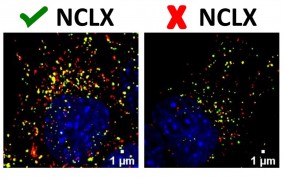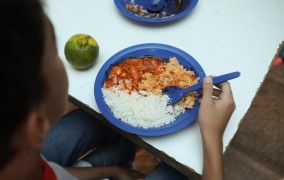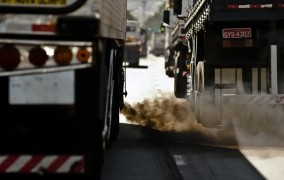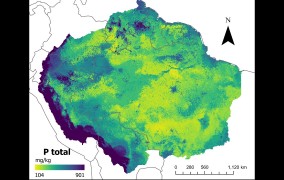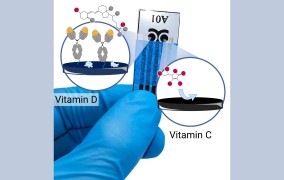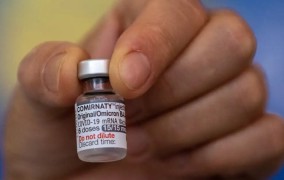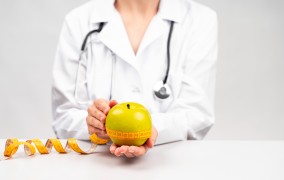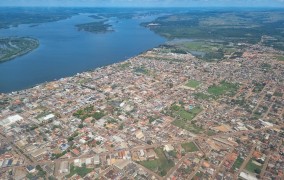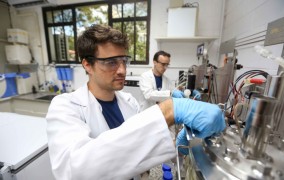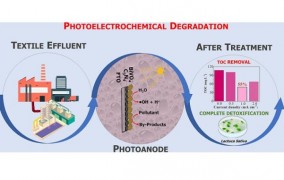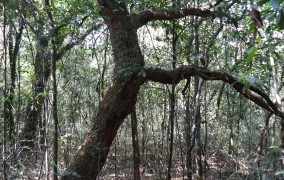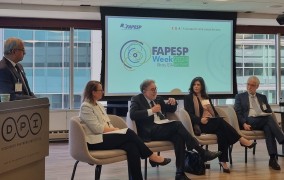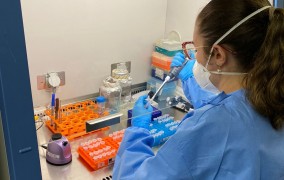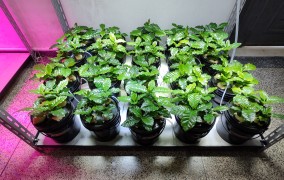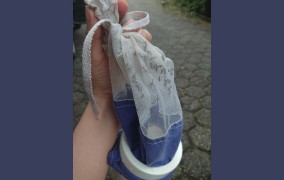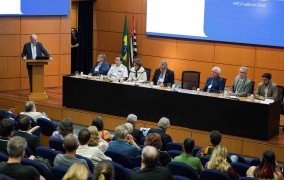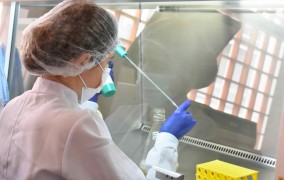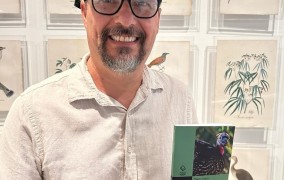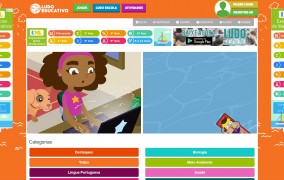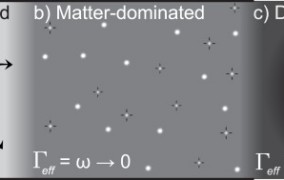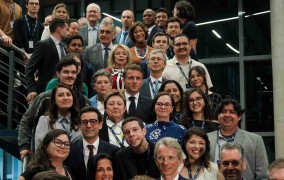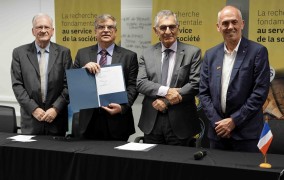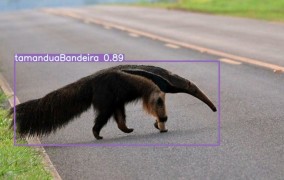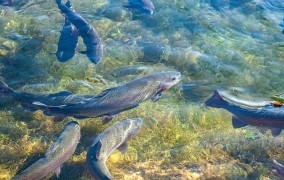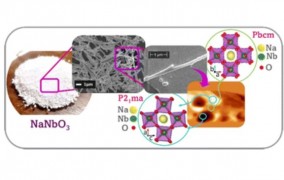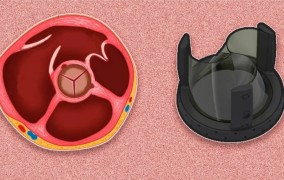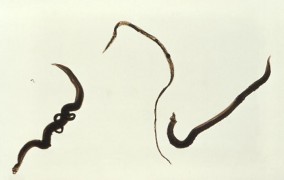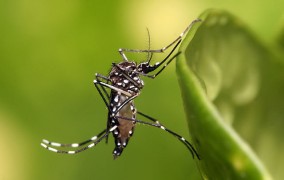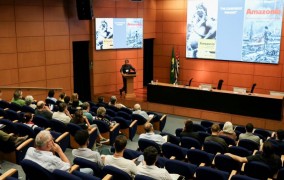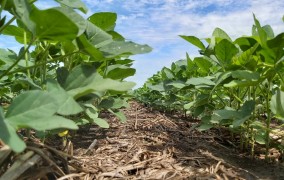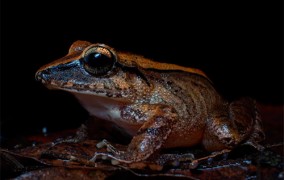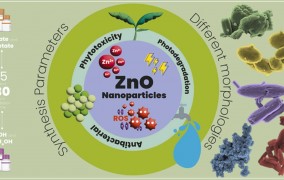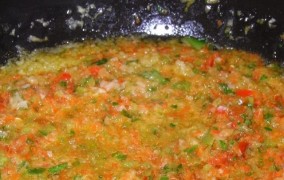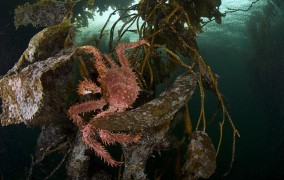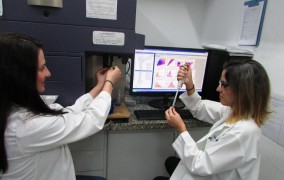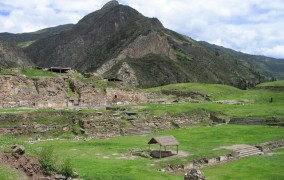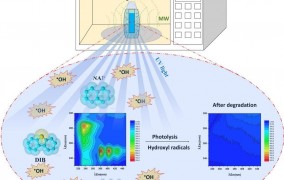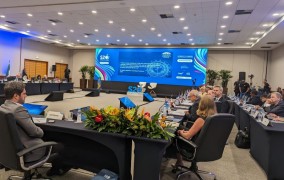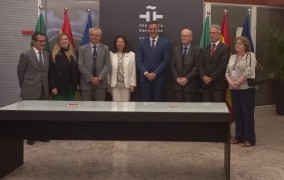
News
-
Study helps understand how energy metabolism is regulated at cellular level
2024-05-01An article published by a FAPESP-supported research center highlights the link between mitochondrial calcium transport and autophagy, the process whereby cells break down and reuse some of their own components. -
International group runs simulations capable of describing South America’s climate with unprecedented accuracy
2024-05-01The aim is to create a computer visualization model that more accurately represents the hydroclimatic processes that occur in the region and to support climate change adaptation measures; the initiative was presented during FAPESP Week Illinois. -
Analysis of flour and rice shows high levels of harmful fungal toxins
2024-05-01The foods, found in the homes of Brazilian families participating in the research, were stored for future consumption. The study is the first in Brazil to use biomarkers to characterize the risk associated with mycotoxins in the diet. -
Research shows link between pollution and heart risks in residents of the city of São Paulo, Brazil
2024-04-29A study by the University of São Paulo, published in the journal Environmental Research, analyzed the results of the autopsies of 238 people and epidemiological data; the risk is greater for hypertensive patients. -
Maps developed with artificial intelligence confirm low levels of phosphorus in Amazonian soil
2024-04-29Research introduces new methodology to describe the amount of the mineral, which is important in the growth cycle of vegetation and can affect the forest’s response to climate change. -
Theories that explain the crisis in democracy are inadequate for Latin America, experts say
2024-04-24Countries in the region are experiencing a different phenomenon from that observed in the United States and Europe, where increased social inequality may have been the cause of the advance of political polarization. The assessment was made by participants in FAPESP Week Illinois. -
Bioelectronic chip detects vitamins C and D in saliva in under 20 minutes
2024-04-24The device was developed at the University of São Paulo and can be used for self-monitoring of micronutrients, assistance with personalized diets, and prevention of deficiencies and toxicity. -
Study confirms effectiveness of bivalent COVID-19 vaccine
2024-04-24Brazilian scientists conducted the first research project to evaluate the immunity induced in an actual group of vaccinated subjects. Their findings are reported in the Journal of Medical Virology. -
Researchers test new behavioral health interventions
2024-04-24Group from the University of Illinois in Chicago creates program to stimulate math learning through physical activity; results of the work were presented at FAPESP Week Illinois. -
Food insecurity is significant among inhabitants of the region affected by the Belo Monte dam in Brazil
2024-04-24A study of 500 households in Altamira, a city near the dam in Pará state, showed that 61% experienced food insecurity. -
Technology for local production of industrial enzymes in Brazil
2024-04-24A startup supported by FAPESP is developing a platform that will enable local production of enzymes to act as catalysts for chemical reactions. -
Light-activated materials perform well in treatment of textile effluent
2024-04-24Investigators affiliated with two FAPESP-supported research centers conducted an experiment using actual effluent from the textile industry. The results are detailed in the journal Chemosphere. -
Without proper management, Cerrado becomes disfigured and less resilient to climate change
2024-04-22A study conducted over a period of 14 years in the Brazilian savanna-like biome shows its typical vegetation rapidly becoming ‘cerradão’ – a biodiversity-poor forest formation – while resistance to drought and wildfires weakens. -
FAPESP seeks to increase research collaboration with the US Midwest
2024-04-17Researchers from universities and research institutions in the State of São Paulo participate in FAPESP Week Illinois; the event aims to create new opportunities for scientific cooperation. -
Air pollution data could be used to plan better transit routes
2024-04-17Researchers from the University of São Paulo are producing maps that show areas of the city of São Paulo with the highest concentration of air pollutants; the results of the studies were presented in the United States during FAPESP Week Illinois. -
DNA vaccine against zika performs well in tests on mice
2024-04-17The vaccine is being developed by researchers in Brazil. The results of preclinical trials are published in the journal Frontiers in Immunology. -
Consortium including Brazilians sequences the reference genome of Arabica coffee
2024-04-17The work makes it possible to tell the story of the fusion of genomes that gave rise to the world’s most consumed species, as well as identifying genes responsible for resistance to rust and other diseases. -
Arboviruses, mosquitoes and potential hosts tracked in real time in São Paulo city
2024-04-17The technology used to sequence the first infections by SARS-CoV-2 at record speed has been successfully tested as a technique to monitor viruses transmitted by mosquitoes, such as dengue, zika, chikungunya and yellow fever. -
PROASA program will advance knowledge of South Atlantic and Antarctic
2024-04-17Launched on April 2 at FAPESP, the program will initially involve researchers from Brazil, Argentina and France. -
Startup develops alternative treatment for atopic dermatitis
2024-04-17Researchers supported by FAPESP have created a drug using antibodies for direct application to the skin. -
UNESP professor brings together accounts of journeys to inhospitable places and reflections on the future in book
2024-04-17Written by São Paulo State University’s biologist Mauro Galetti Rodrigues, A Naturalist in the Anthropocene aims to inspire young scientists and nature lovers. -
Ludo Educativo games portal surpasses 20 million views
2024-04-17Dissemination project of the Center for the Development of Functional Materials – a research center supported by FAPESP and based at the Federal University of São Carlos – is aimed at primary and secondary school students and teachers. -
Study uses thermodynamics to describe expansion of the Universe
2024-04-15The shift from a decelerating expansion regime (in the radiation- and matter-dominated era) to an accelerating expansion regime (in the dark energy-dominated era) resembles a thermodynamic phase transition, according to an article in Results in Physics by scientists affiliated with São Paulo State University. -
Hydrogen recombination found to be most plausible explanation for high levels of energy in stellar superflares
2024-04-15The study investigated 42 superflares and concluded that this model is more consistent from the physical standpoint. -
French President Emannuel Macron unveils a branch of Institut Pasteur at the University of São Paulo
2024-04-10The new member of the Pasteur Network, which comprises 33 laboratories in 25 countries, is being equipped with the support of FAPESP, which is also funding several young researchers associated with the institute. -
International Research Center of France’s leading public-sector scientific research organization is unveiled at the University of São Paulo
2024-04-10FAPESP signed a memorandum of understanding to fund projects that will be conducted at the IRC. -
French Guiana joins Amazon+10 Initiative
2024-04-10An agreement to this end was signed in Belém in the Brazilian Amazon during the visit of French President Emmanuel Macron and Laurent Linguet, President of the University of French Guiana. The aim is to foster international cooperation that furthers the development of the Amazon region. -
Most patients treated by public psychiatric outpatient clinics are women aged 45 on average
2024-04-10In Brazil, researchers analyzed data for 8,384 clinical appointments that took place in a two-year period at Hospital de Base in São José do Rio Preto (São Paulo state) and found the situation to be similar to those in publicly-funded psychiatric outpatient clinics elsewhere in the country. The results, reported in Frontiers in Psychiatry, list the most common mental health problems and most frequently prescribed drugs. -
System uses artificial intelligence to detect wild animals on roads and avoid accidents
2024-04-10The researchers trained computer vision models to identify Brazilian mammals must susceptible to roadkill in real time and are partnering with toll road operators to test the system in real-world situations. -
Weight training improves symptoms of anxiety and depression in old people, study confirms
2024-04-10Brazilian researchers analyzed more than 200 articles on the subject and identified the types of training most indicated for these cases. Their findings are reported in the journal Psychiatry Research. -
Water filtration and DNA extraction help fish farmers protect animal health
2024-04-10A startup supported by FAPESP has developed a solution to prevent disease in fish tanks by means of environmental monitoring. -
Article describes method for synthesizing material that can be used to collect and store energy
2024-04-10Sodium niobate is a type of ceramic with properties of interest to green chemistry; scientists from the Center for the Development of Functional Materials and collaborators have developed a new strategy for obtaining it. -
Brazilian scientists design innovative heart valve
2024-04-10Study developed at Center for Mathematical Sciences Applied to Industry aims to perfect device for cardiovascular treatments. -
Innovative molecular biology technique allows for discovery of novel targets for candidate vaccines against schistosomiasis
2024-04-03Experiments conducted at Butantan Institute in São Paulo used phage display to screen 12,000 proteins found in Schistosoma mansoni, the worm that causes the disease. The method deployed bacteriophages, viruses that infect bacteria, to identify key parasite peptides. -
University of Illinois plans new model for research collaboration with Brazil
2024-04-03The Brasillinois program, which will be launched this month during FAPESP Week Illinois in the United States, aims to promote student and faculty mobility and foster connections in areas such as climate and sustainability, medicine, public health, and social inclusion. -
Dengue-bearing mosquito and other invasive species in Brazil cause annual losses of up to BRL 15 billion
2024-04-03The number may be an underestimate in light of gaps in studies of the problem, according to the authors of a report issued by the Brazilian Platform on Biodiversity and Ecosystem Services. -
In the remote past, the Amazon had large cities connected by roads
2024-04-03This was the subject of the second FAPESP Lecture 2024, delivered by archeologist Eduardo Neves, one of the leading proponents of the major revision that changed the way researchers think about the Amazon’s past. -
Genetic improvement of conventional soybeans generates special varieties
2024-04-03A startup supported by FAPESP is developing novel cultivars to offer growers a high-value-added option. -
Amphibians use scream inaudible to humans for self-defense against predators, study suggests
2024-04-03For the first time in South America, researchers recorded the use of ultrasound by a frog endemic to the Atlantic Rainforest in Brazil, which has more species of amphibians than any other country. Other frogs may use very high-frequency calls for the same purpose. -
Study describes strategy for inactivation of multidrug-resistant bacteria
2024-04-03Zinc oxide nanoparticles with varying morphologies were tested against microorganisms isolated from patients. The results are reported in the Journal of Environmental Chemical Engineering. -
Mediterranean sauté recipe induces metabolic changes that mitigate weight gain, study suggests
2024-04-03The health benefits of the so-called “sofrito” were observed in experiments with rats conducted by scientists from the Food Research Center and collaborators. The effect may be linked to a compound identified in the animals’ livers called butanediol. -
Project combines data science and sociology to map crime
2024-04-03With the support of FAPESP, the research is developing mathematical and computational tools that will address issues related to public safety in an innovative way. -
Database maps São Paulo’s bus corridors
2024-04-03Center for Metropolitan Studies research covers nearly 200 kilometers of roads in the Metropolitan Region. -
Chile-Brazil collaboration is studying impact of climate change in one of the world’s most untouched places
2024-03-27Working in partnership with scientists at the University of Magallanes in Chile, Brazilian researchers are conducting studies of the Chilean subantarctic region. -
Protein created by Brazilian startup could help treat diseases caused by HPV
2024-03-27Developed by ImunoTera as part of a project supported by FAPESP, the molecule triggers the immune system’s response to infected cells and helps combat the disease. -
Study reveals evidence of violence at a time of crisis in ancient Peru
2024-03-27Analysis of skeletons exhumed at a burial ground dating from the period 500-400 BCE, shortly after the collapse of the Chavín culture, revealed lethal injuries inflicted on men, women and children, as well as signs of material poverty. -
Researchers obtain promising results for control of pollutants in water
2024-03-27Brazilian scientists tested a simple and sustainable method for monitoring and degrading a mixture of polycyclic aromatic hydrocarbons, compounds present in fossil fuels and industrial waste. -
Science20 Brazil emphasizes importance of science to global transformation
2024-03-27Representatives of science academies in 19 countries and organizations in Brazil and elsewhere assembled in Rio de Janeiro to begin producing documents and recommendations on science, technology and innovation for the G20 summit in November. -
Spanish public-sector R&D enterprise and FAPESP sign memorandum of understanding for ST&I cooperation
2024-03-27Pedro Sánchez, Prime Minister of Spain, was present at the ceremony in São Paulo where the MoU was signed by the Spanish ambassador to Brazil and the President of FAPESP. -
Group obtains patent for method to create more natural, effective and environmentally friendly sunscreens
2024-03-27Developed by researchers at the University of São Paulo, the process proposes using silica particles coated with melanin in formulations to protect the skin not only from UVA and UVB rays, but also from visible light.
Most popular
-
Parents’ alcohol and drug use influences their children’s consumption, research shows
2026-02-13
-
Impact-formed glass evidence of cosmic collision in Brazil about 6 million years ago
2026-02-18
-
Second spider-parasitic mite described in Brazil
2026-01-05
-
Babies exposed to poverty show delays in motor development as early as six months
2026-03-02
-
Study reveals protein linked to spread of pancreatic cancer through nerves
2026-01-14
-
Study warns of nutritional risks of prolonged use of the drug omeprazole
2026-02-04
-
The ‘yo-yo effect’ impairs metabolism and reduces brown fat activity in women
2026-02-02
-
Research shows how immune system reacts to pig kidney transplants in living patients
2026-01-08
-
Artificial saliva containing sugarcane protein helps protect the teeth of patients with head and neck cancer
2026-01-07
-
Brazilian research reveals how some types of breast cancer ‘evade’ treatment
2026-01-21





